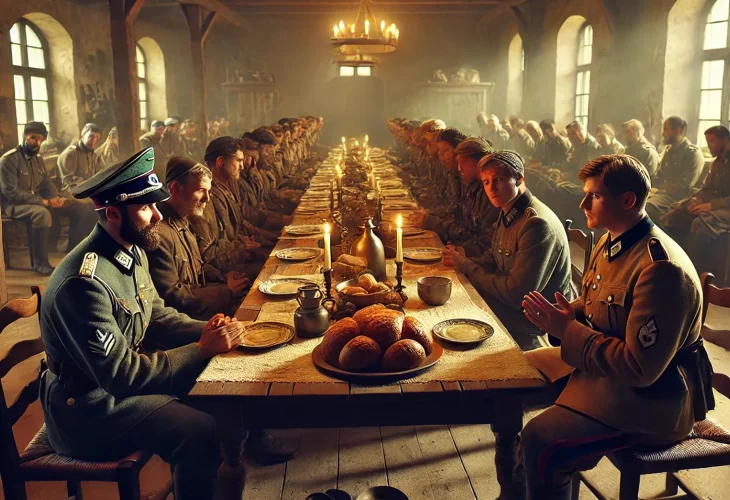The First Jewish Officer in Prussia: The Remarkable Story of Mano Burg
To everyone's amazement, the soldiers scolded the homeowner: This is Mano Burg, the Jewish major, don’t you recognize him?

1840, the town of Nysa, Friday afternoon. A troop of Prussian soldiers hurriedly made their way through the town, following the custom of selecting the largest and most spacious home to lodge in for a day or two. The house they chose belonged to the renowned financier, Louis Gross. After settling into the guest rooms, the soldiers gathered for a meal. The homeowner seated the major, who commanded the troop, beside him and explained in fluent German, "Among us Jews, we have a custom to bless the bread before cutting it." "Certainly," interrupted the officer, grabbing two loaves of bread and reciting: "Blessed are You, Hashem, our God, King of the universe, who brings forth bread from the earth..."
To everyone's amazement, the soldiers scolded the homeowner: This is Mano Burg, the Jewish major, don’t you recognize him?
Mano Burg was born in Berlin in 1789. He attended Jewish schools and excelled in his studies. He later became a builder by profession. In 1813, he undertook efforts for the Prussian army. Commanders who noticed his intelligence wanted to enlist him, but the idea faced significant resistance: A Jew? Bearing arms? Such a reality did not exist in Germany at that time. The one who insisted on Burg's enlistment was Prince August of the House of Hohenzollern. He personally ensured Burg's entry into the army and aided in his promotion in accordance with his talents.
Prussian soldiers took their oaths of allegiance to the Emperor on Christian texts, but Burg was the first soldier to swear on a Jewish Torah scroll. A Jewish rabbi was specially brought to the fortress where recruits were stationed, and he held the Torah so the first Jewish soldier could take his oath to the Prussian Emperor. One hand on the Torah, the other on the cannon.
Burg began his service at the Spandau Fortress, where his building skills aided him in planning and executing fortifications. His superiors wished to promote him to officer rank, but again encountered resistance. Ultimately, Prince August intervened once more, and Burg's promotion was realized. He became a lieutenant and served as an artillery officer. Marching at the head of a regiment of gunners from Spandau to Danzig, they passed a Jewish elder who was overwhelmed by the sight and bowed before the imposing military convoy. Burg halted and addressed him: Rabbi, don’t fear us. We are brothers, and I am no more important than you. The Jewish elder rubbed his eyes, believing he was dreaming...
Burg developed a method of drafting artillery plans akin to architectural blueprints. His method received special commendation from King Friedrich Wilhelm III. The director of the Artillery School wrote of him, "This truly noble and honorable man recreated artillery drafting, turning it from a craft into an art."
As Burg climbed the military hierarchy, the pressures mounted: They wanted to promote him further, but he must convert to Christianity to do so. In a famous letter, Burg wrote, "There is nothing that would compel me to renounce the faith in which I was born and raised, the faith from which I drew encouragement and comfort in all the tough times." Indeed, he advanced despite being a proud Jew. In 1832, he was promoted to captain, and in 1847 he was appointed a major.
In his later service years, Burg lived in Berlin. Each morning, he would don his military uniform, shoulder his weapon, and head to the synagogue for Shacharit prayers, wearing a tallit over his uniform. He would then participate in a lesson given by Rabbi Michael Sachs, a scene remembered for years by the elders of Berlin.
Adorned with numerous commendations and military medals, Burg cared deeply for his community. As he had no children, he dedicated a portion of his wealth to the Orbach Orphanage in Berlin. In 1853, Mano Burg passed away, and in his memory, the Jewish orphanage in Berlin established a special day of learning in his honor, which concluded with all the children reciting Kaddish for the elevation of the soul of the Jewish major. This tradition continued for nearly eighty years, until the Kristallnacht.

